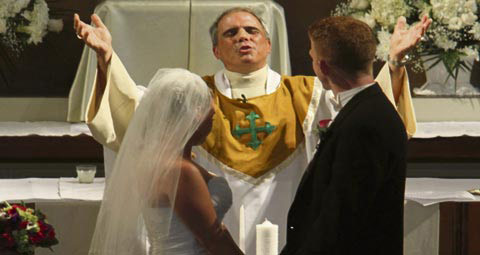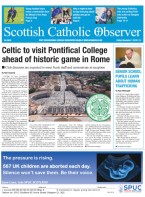BY Ian Dunn | January 28 2011 | ![]() 0 COMMENTS
0 COMMENTS ![]() print
print

Catholic marriage is no one’s right
Publication Date: 2011-01-28
- Holy Father's warning of serious obligations is echoed by Scottish Catholic Marriage Tribunal
A man and a woman’s natural right to marry should not be confused with having the right to a Catholic wedding, Pope Benedict XVI has warned.
The Holy Father said that the Catholic Church has a very specific religious understanding of what marriage is and that ‘no one can claim the right to a marriage ceremony’ in the Church.
Mgr Peter Magee of the Scottish Catholic Marriage Tribunal told the SCO this week that the Pope’s message underlines the very real obligations and preparations required for Catholic marriage.
Celebrating marriage
The right to contract marriage ‘presupposes that one is able to and intends to truly celebrate it, that is, in the truth of its essence as taught by the Church,’ Pope Benedict said last Saturday when he appealed for effective pastoral action in marriage preparation.
He made the comments during an audience with members of the Roman Rota, a Vatican-based tribunal that deals with marriage and annulment.
“Often it is assumed that the priest must act with largesse, since the natural right of persons to marry is at stake,” the Pope added, but for the Catholic Church, there exists only one kind of marriage—sacramental—and the right of Catholic couples to celebrate the sacrament can be exercised only if they fully understand what they are doing.
For the Catholic Church, marriage is a sacrament that is witnessed by a priest or deacon, but performed by the couple who pledge their union will be forever and that they will be open to having and educating children, the Pope said.
Marriage preparation
In his annual meeting with the tribunal officials, Pope Benedict said he wanted to focus on the legal or juridical aspect of Catholic marriage preparation programmes, because too often engaged couples—and even those preparing them for marriage—consider the courses simply a bureaucratic hurdle to overcome before the wedding.
Pope Benedict said anyone involved in marriage preparation programmes, but especially the priest or other pastoral worker conducting the obligatory pre-marriage interviews with the potential bride and potential groom, has an obligation to ensure there is nothing standing in the way of a valid and licit celebration of the sacrament.
For the marriage to be valid, the couple must understand the commitment being undertaken, he said.
Pastoral workers and marriage tribunal officials together ‘must work to interrupt, to the extent possible, the vicious cycle frequently noted of too easily allowing couples to marry without adequate preparation’ and ‘the sometimes equally easy judicial declaration’ that a marriage is invalid, the Pope said. Both approaches give people a sense that the Catholic Church no longer sees marriage as truly being binding forever, he said.
Scottish perspective
Mgr Magee, of the Scottish Catholic Marriage Tribunal, said the Pope’s words stressed the vital sacramental nature of Catholic marriage and the obligations that entailed.
“Marriage is a human right that should be free to all, but the sacrament of marriage, a Catholic marriage requires a greater awareness, greater preparation and a level of appreciation of what’s involved: that the couple are entering a vocation,” he said.
“We want marriage to be accessible but a sacramental Catholic marriage is not an Eastenders marriage, it’s a very serious thing. People need to realise there are obligations in Catholic marriage, the pre-marriage enquiry and so on that must be taken seriously by the couple and the priest.”
While the number of divorces in Scotland has fallen to a 30-year low, Scottish Government figures released last month also revealed that there were 10,173 divorces in 2009/10. However, the reports showed that Catholic marriages last the longest.
“Statistics showing that Catholic marriages last 50 per cent longer than others is also a hopeful sign, suggesting that the increased take-up of the marriage preparation courses offered by the Church in partnership with Scottish Marriage Care is having an effect,” Cardinal Keith O’Brien, president of the Bishops’ Conference of Scotland, said when the report was published.










